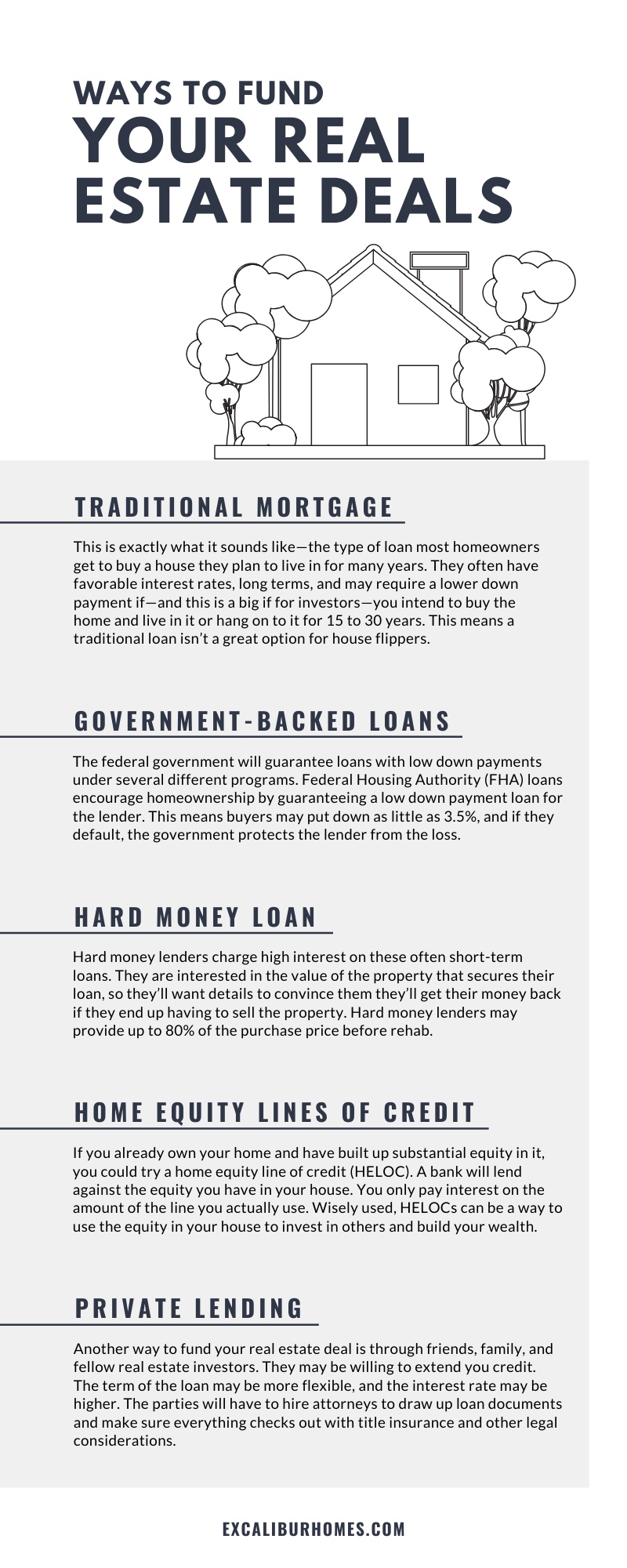
Real estate investors with cash at the ready have an advantage: They can buy an investment property quickly, without waiting for financing or encumbering the property with a lien from a lender. However, cash isn’t the only way to get started. Many real estate investors begin by using borrowed money or by creating partnerships with other investors. There are varieties of ways to fund your real estate deals. We explore several of them below.
Traditional Mortgage
This is exactly what it sounds like—the type of loan most homeowners get to buy a house they plan to live in for many years. They often have favorable interest rates, long terms, and may require a lower down payment if—and this is a big if for investors—you intend to buy the home and live in it or hang on to it for 15 to 30 years. This means a traditional loan isn’t a great option for house flippers.
A lower down payment means that the lender will require private mortgage insurance, or “PMI,” which adds to the monthly cost of the loan. PMI drops off the loan as you build equity in the property.
Investors will likely pay a higher interest rate and a larger down payment on a traditional mortgage. Buyers who can invest 20% of the purchase price usually won’t be required to obtain PMI. There is also a limit on how many traditional type mortgages you can hold at one time.
These traditional mortgages work well for owner-occupied properties of up to four units. You can buy a four-flat, live in one of the units, and charge rent for the other three.
Government-Backed Loans
The federal government will guarantee loans with low down payments under several different programs. Federal Housing Authority (FHA) loans encourage homeownership by guaranteeing a low down payment loan for the lender. This means buyers may put down as little as 3.5%, and if they default, the government protects the lender from the loss. An FHA loan requires the borrower to live in the property for at least a year. The low down payment means that the buyer has to pay a mortgage insurance premium that doesn’t disappear, even as you build equity in the property. You can only take out one such loan at a time, and the loan must be in the name of the borrower, not a legal entity like an LLC. These loans also require strict HUD inspections and appraisals on the property.
If you’re buying a “fixer-upper,” you can get a loan called a 203(k). Similar to an FHA loan, this is for owner-occupiers and has a low down payment. These loans allow you to wrap the cost of rehabbing the property into the loan (but only if you have licensed contractors, approved by your lender, do the work). This might be a good option for investors looking to purchase distressed properties or foreclosures in anticipation of property value appreciating over the term of the loan.
Veterans get especially good deals from the VA. Veteran’s Administration loans require no down payment. They do require the borrower to live in the property for at least a year. VA loans don’t require PMI, which lowers the monthly cost of the loan, and they feature low interest rates. There is no limit to the number of properties veterans can finance, as long as they live in each of them for a year. After that time, the borrower can rent out the first house and move on to the next.
Traditional and government-backed loans take time to process and require a lot of paperwork. That’s not great for investors competing against cash buyers. There are a few other options for investors to get to closing more quickly:
Hard Money Loan
The “hard” in “hard money” doesn’t refer to difficulty in obtaining the loan. On the contrary, it may be easier for established investors to qualify for a hard money loan because the property or “hard asset” secures the loan. Hard money lenders charge high interest on these often short-term loans. They are interested in the value of the property that secures their loan, so they’ll want details to convince them they’ll get their money back if they end up having to sell the property. Hard money lenders may provide up to 80% of the purchase price before rehab. Sometimes used as “bridge” loans while investors wait for other financing, hard money loans carry the risk of changing market conditions for those who want to refinance to keep and rent, rather than flip, a property.
Home Equity Lines of Credit
If you already own your home and have built up substantial equity in it, you could try a home equity line of credit (HELOC). A bank will lend against the equity you have in your house. You only pay interest on the amount of the line you actually use. Wisely used, HELOCs can be a way to use the equity in your house to invest in others and build your wealth. However, to get a HELOC, you are pledging your home, and you could lose it if you fail to make payments. Using the equity you have built up in your home to invest in another one is like starting all over again, paying for some or all of the cost of your house twice. Investors should be very confident of their ability to generate income from their investments before risking their own home on a home equity line of credit.
Private Lending
Another way to fund your real estate deal is through friends, family, and fellow real estate investors. They may be willing to extend you credit. The term of the loan may be more flexible, and the interest rate may be higher. The parties will have to hire attorneys to draw up loan documents and make sure everything checks out with title insurance and other legal considerations. Borrowing money from friends, family, and business associates can sour relationships, if hard times hit and the borrower gets behind on payments, so think hard about creating this kind of obligation.
Buyers seeking investment property in Atlanta, Georgia, and surrounding areas are welcome to contact Excalibur Homes for expertise in the local market for investment properties and financing.



